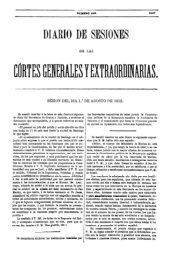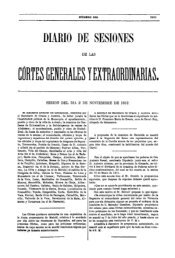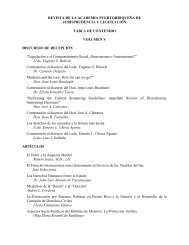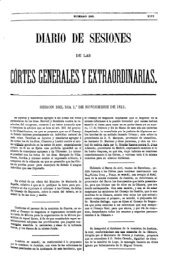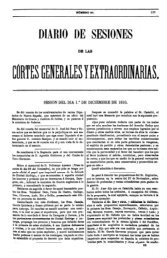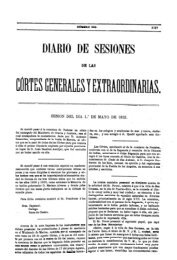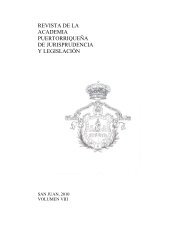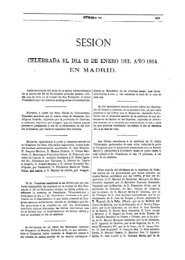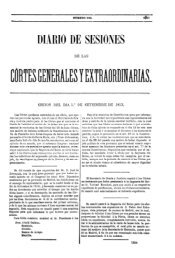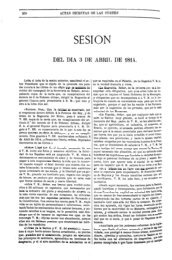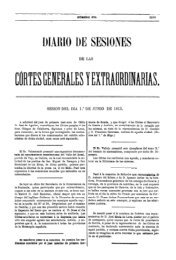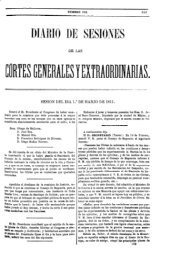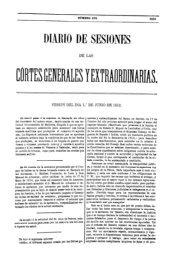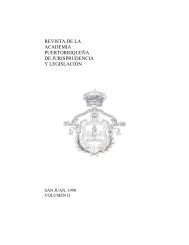Revista Volumen I (formato pdf) - Academia Puertorriqueña de ...
Revista Volumen I (formato pdf) - Academia Puertorriqueña de ...
Revista Volumen I (formato pdf) - Academia Puertorriqueña de ...
You also want an ePaper? Increase the reach of your titles
YUMPU automatically turns print PDFs into web optimized ePapers that Google loves.
184 Rev. Acad. Puert. De Jur. Y Leg. 1:1 177, 1989correcto <strong>de</strong>l idioma, con excepciones claro está. Ya lo expresaba otrojurista, el novelista inglés, Henry Fielding, al sostener que los abogadosescriben <strong>de</strong>safiando las reglas <strong>de</strong>l idioma. Apunta Fielding que: "And asto the lawyer, they are well known to have been very little acquaintedwith the commonwealth of literature, and to have always acted and writtenin <strong>de</strong>fiance to its laws". 20 A pesar <strong>de</strong> que como dice José Puig Brutauen su artículo titulado: "El lenguaje <strong>de</strong>l <strong>de</strong>recho". 21 "Los conceptos y laspalabras que las expresan son los instrumentos <strong>de</strong>l Derecho." Igual afirmaciónhizo años antes Glanville Williams en su estudio "Language andthe Law" 22 expresa que:Coming down to the more narrowly professional point of view,words are of central importance for the lawyer be- cause they are,in a very particular way, the tools of his tra<strong>de</strong>. Words occupy thelawyer's attention in the drafting and interpretation of statutes,wills, contracts and other legal documents. Other specialists, suchas engineers, surgeons, and painters, are also concerned ín partwith words (namely, the words in which they communicate theiri<strong>de</strong>as to each other), but not to the extent that lawyers are. 2320 Henry Fielding, "The Commonwealth of Letters, (1732), citado por G.V.V.Nicholls, "Of Writing by Lawyers", The Canadian Bar Review, Volume XXVII,1999, p. 1209.21 José Puig Brutau, "El lenguaje <strong>de</strong>l Derecho", <strong>Revista</strong> <strong>de</strong> Derecho Privado,Tomo XXXV, (1952), p. 977, cita a la página 982.22 Glanville Williams, "Language and the Law", The Law Quarterly Review,Volume 61, (1945), p. 71; p. 179; p. 293; p. 384; Volume 62, (1446), p. 387.Para unas interesantes observaciones sobre el lenguaje y el pensamiento jurídicovéase, Otto Brusiin, El pensamiento jurídico, traducción <strong>de</strong>l alemán por JoséPuig Brutau, Buenos Aires, Ediciones Jurídicas Europa-América, 1959, III, "Losproductos <strong>de</strong>l pensamiento jurídico," p. 95, especialmente <strong>de</strong>s<strong>de</strong> la página 119.23 Cf. William Seagle, "The dictionary theory of justice" en su libro, Law. Thescience of inefficiency, New York, The Macmillan Company, 1952, II, p.16. Allíse indica que:"The mechanisms of justice are no more conducive to its efficiency than theconfusion of its objectives. Justice rests upon the dictionary. Legal rights andduties are <strong>de</strong>duced from words -words employed by parties in making contracts,will, and in entering into other types of legal transactions, words employed bycourts in formulating rules of law in judicial <strong>de</strong>cisions, and words employed bylawmakers in co<strong>de</strong>s of law and in individual acts of legislation. Words, ofcourse, are employed in other sciences; but in such sciences, they serve merelythe purpose of recording their results. Words are, however, the very tools of thelaw. The dictionary is always the most important book in the lawyer's library."



